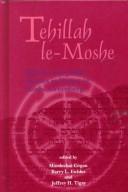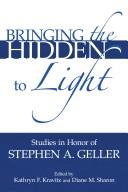| Listing 1 - 10 of 1081 | << page >> |
Sort by
|
Book
ISBN: 1628370580 1628370572 1628370599 9781628370591 9781628370577 9781628370584 Year: 2014 Publisher: Atlanta: SBL Press,
Abstract | Keywords | Export | Availability | Bookmark
 Loading...
Loading...Choose an application
- Reference Manager
- EndNote
- RefWorks (Direct export to RefWorks)
Women in the Bible. --- Women in Judaism. --- Bible. --- Criticism, interpretation, etc. --- Judaism --- Agiografi --- Hagiographa --- Kethubim --- Ketuvim --- Exegese Oude Testament --- Bijbels milieu --- Vrouwen in de Bijbel --- Wijsheidsliteratuur
Book
ISBN: 1575068516 9781575068510 9781575068183 1575068184 Year: 2013 Publisher: Winona Lake, Indiana Eisenbrauns
Abstract | Keywords | Export | Availability | Bookmark
 Loading...
Loading...Choose an application
- Reference Manager
- EndNote
- RefWorks (Direct export to RefWorks)
Religion
---
Philosophy & Religion
---
Christianity
---
Esther,
---
Ester,
---
Esther
---
Biblische Person
---
Hadassah,
---
אסתר
---
אסתר,
---
Istir,
---
Bible.
---
Altes Testament.
---
Altes Testament
---
Tenach
---
Testamentum vetus
---
Vetus testamentum
---
Erstes Testament
---
<
Book
ISBN: 9780190212438 0190212438 9780190900526 0190900520 9780190212452 0190212454 Year: 2018 Publisher: New York: Oxford university press,
Abstract | Keywords | Export | Availability | Bookmark
 Loading...
Loading...Choose an application
- Reference Manager
- EndNote
- RefWorks (Direct export to RefWorks)
This Oxford Handbook is a serious resource for the study of the literature of the Writings (Psalms, Job, Proverbs, Ruth, Esther, Lamentations, Ecclesiastes, Song of Songs, Ezra-Nehemiah, Chronicles, Daniel) of the Hebrew Bible, including its context and its scriptural/canonical shape and reception. A first section provides an overview of the post-exilic period in which much of the Writings was written, focusing on history, archeology, and the development of major literary traditions, all of which provide the context for understanding and interpreting this literature. A second section contains creative studies of the books in the Writings, focusing on structure, purpose, and distinctive characteristics of this very diverse literature. A third section looks at the Writings from larger and longer perspectives including the ancient Near East, developing Judaism and Christianity, Qumran and the Dead Sea Scrolls, music and the arts, and its canonization and reception by Judaism and Christianity. This handbook has a focus on the special character and shape of the Writings as scripture and canon, including the recurring issues of diversity and difference, dates of canonization, its special relationship to other scripture and canon (Torah, Prophets, New Testament), and its interpretation in religious and non-religious communities.
Bible. --- Agiografi --- Hagiographa --- Kethubim --- Ketuvim --- Criticism, interpretation, etc. --- 221 <03> --- 221 <03> Bible: Ancien Testament--Naslagwerken. Referentiewerken --- 221 <03> Bijbel: Oud Testament--Naslagwerken. Referentiewerken --- Bible: Ancien Testament--Naslagwerken. Referentiewerken --- Bijbel: Oud Testament--Naslagwerken. Referentiewerken
Book
ISBN: 1946230243 1946230049 Year: 2017 Publisher: Claremont, California : Claremont Press,
Abstract | Keywords | Export | Availability | Bookmark
 Loading...
Loading...Choose an application
- Reference Manager
- EndNote
- RefWorks (Direct export to RefWorks)
Bible. --- Criticism, interpretation, etc. --- Antico Testamento --- Hebrew Bible --- Hebrew Scriptures --- Kitve-ḳodesh --- Miḳra --- Old Testament --- Palaia Diathēkē --- Pentateuch, Prophets, and Hagiographa --- Sean-Tiomna --- Stary Testament --- Tanakh --- Tawrāt --- Torah, Neviʼim, Ketuvim --- Torah, Neviʼim u-Khetuvim --- Velho Testamento
Book
ISBN: 194623026X 1946230138 Year: 2017 Publisher: Claremont, California : Claremont Press,
Abstract | Keywords | Export | Availability | Bookmark
 Loading...
Loading...Choose an application
- Reference Manager
- EndNote
- RefWorks (Direct export to RefWorks)
Bible. --- Theology --- History --- Antico Testamento --- Hebrew Bible --- Hebrew Scriptures --- Kitve-ḳodesh --- Miḳra --- Old Testament --- Palaia Diathēkē --- Pentateuch, Prophets, and Hagiographa --- Sean-Tiomna --- Stary Testament --- Tanakh --- Tawrāt --- Torah, Neviʼim, Ketuvim --- Torah, Neviʼim u-Khetuvim --- Velho Testamento
Book
ISBN: 0827610327 9780827610323 9780827608511 0827608519 Year: 2008 Publisher: Philadelphia: The Jewish Publication Society,
Abstract | Keywords | Export | Availability | Bookmark
 Loading...
Loading...Choose an application
- Reference Manager
- EndNote
- RefWorks (Direct export to RefWorks)
Bible. --- Antico Testamento --- Hebrew Bible --- Hebrew Scriptures --- Kitve-ḳodesh --- Miḳra --- Old Testament --- Palaia Diathēkē --- Pentateuch, Prophets, and Hagiographa --- Sean-Tiomna --- Stary Testament --- Tanakh --- Tawrāt --- Torah, Neviʼim, Ketuvim --- Torah, Neviʼim u-Khetuvim --- Velho Testamento --- Bible
Book
ISBN: 0830871942 9780830871940 9780830810512 083081051X Year: 2014 Publisher: Downers Grove, IL
Abstract | Keywords | Export | Availability | Bookmark
 Loading...
Loading...Choose an application
- Reference Manager
- EndNote
- RefWorks (Direct export to RefWorks)
Following the format of the Essentials series (as designed by Greg Ogden, author of Discipleship Essentials), this comprehensive guide from Tremper Longman offers a survey of the Old Testament for use in the context of a small group. Each study contains a question-answer format, a field-tested inductive Bible study and questions to draw out key principles.
Bible. --- Antico Testamento --- Hebrew Bible --- Hebrew Scriptures --- Kitve-ḳodesh --- Miḳra --- Old Testament --- Palaia Diathēkē --- Pentateuch, Prophets, and Hagiographa --- Sean-Tiomna --- Stary Testament --- Tanakh --- Tawrāt --- Torah, Neviʼim, Ketuvim --- Torah, Neviʼim u-Khetuvim --- Velho Testamento
Book
ISBN: 1575066165 9781575066165 9781575061726 1575061724 Year: 2021 Publisher: University Park, PA
Abstract | Keywords | Export | Availability | Bookmark
 Loading...
Loading...Choose an application
- Reference Manager
- EndNote
- RefWorks (Direct export to RefWorks)
In the Judeo-Christian tradition, the deity YHWH is often portrayed as an old man. One of the epithets used of YHWH in the Hebrew Bible, the Ancient of Days, is a source for this depiction of God as elderly. Yet, when we look closely at the early traditions of biblical Israel, we see a different picture: God is relatively youthful, a warrior who defends his people. This book is an examination of the question: How did God become old? The transformation from young deity to Ancient of Days took place at the intersection of two trajectories in the traditions of Israel. One trajectory is reflected in the way that apocalyptic traditions found in the book of Daniel recast the old Canaanite mythic imagery seen in the Ugaritic and early biblical texts. This trajectory allows YHWH to take on qualities, such as old age, that were not associated with him during most of Israel's history but were associated with El in the Canaanite traditions. The second trajectory, a depiction of Israel's God as elderly, is connected with the development of the idea of YHWH as father. The more comfortable the biblical tradents became with portraying YHWH as a father a metaphor that was not embraced in the early traditions the easier it became for the people of Israel to think of YHWH as occupying a stage of the human life cycle.
God (Judaism)
---
Age of God
---
Age
---
Age.
---
Attributes
---
Bible.
---
Antico Testamento
---
Hebrew Bible
---
Hebrew Scriptures
---
Kitve-ḳodesh
---
Miḳra
---
Old Testament
---
Palaia Diathēkē
---
Pentateuch, Prophets, and Hagiographa
---
Sean-Tiomna
---
Stary Testament
---
Tanakh
---
Tawrāt
---
Torah, Neviʼim, Ketuvim
---
Torah, Neviʼim u-Khetuvim
---
Velho Testamento
---
Criticism, interpretation, etc.
---
Gottesvorstellung.
---
Alter.
---
Zeit.
---
Eigenschaft Gottes.
---
Literatur.
---
Jahwe.
---
Altes Testament.
---
Altes Testament
---
Tenach
---
Testamentum vetus
---
Vetus testamentum
---
Erstes Testament
---
<

ISBN: 1575065053 9781575065052 1575060272 9781575060279 Year: 1997 Publisher: Winona Lake: Eisenbrauns,
Abstract | Keywords | Export | Availability | Bookmark
 Loading...
Loading...Choose an application
- Reference Manager
- EndNote
- RefWorks (Direct export to RefWorks)
Forty-five scholars here combine their skills in tribute to their colleague, teacher, and friend. This collection includes 27 English and 18 Hebrew essays on literary criticism, rabbinic literature, Hebrew word studies, Septuagint, Qumran, textual criticism, and many other topics. Moshe Greenberg is perhaps best known for his commentary on Ezekiel in the Anchor Bible series.
Bible.
---
Antico Testamento
---
Hebrew Bible
---
Hebrew Scriptures
---
Kitve-ḳodesh
---
Miḳra
---
Old Testament
---
Palaia Diathēkē
---
Pentateuch, Prophets, and Hagiographa
---
Sean-Tiomna
---
Stary Testament
---
Tanakh
---
Tawrāt
---
Torah, Neviʼim, Ketuvim
---
Torah, Neviʼim u-Khetuvim
---
Velho Testamento
---
Criticism, interpretation, etc.
---
Criticism, interpretation, etc., Jewish.
---
Electronic books.
---
HISTORY / Ancient / General.
---
Books in machine-readable form
---
Digital books
---
E-books
---
Ebooks
---
Online books
---
Books
---
Electronic publications
---
Bibliografie
---
Aufsatzsammlung
---
Rabbinische Literatur
---
Rabbinische Literatur.
---
Grinberg, Mosheh
---
Grinberg, Mosheh.
---
Greenberg, Moshe.
---
Bibel
---
Altes Testament.
---
"Bible.
---
Altes Testament
---
Tenach
---
Testamentum vetus
---
Vetus testamentum
---
Erstes Testament
---
<

ISBN: 1575065770 9781575065779 1575061244 9781575061245 9781575061245 Year: 2007 Publisher: Winona Lake: Eisenbrauns,
Abstract | Keywords | Export | Availability | Bookmark
 Loading...
Loading...Choose an application
- Reference Manager
- EndNote
- RefWorks (Direct export to RefWorks)
Geller is Irma Cameron Milstein Professor of Bible at Jewish Theological Seminary. Geller's attention to language and interest in applying the methods of literary analysis to the Hebrew Bible are reflected in his work throughout his career. He has addressed such topics as "The Dynamics of Parallel Verse" in Deuteronomy 32, the "Language of Imagery in Psalm 114," and the literary uses of "Cleft Sentences with Pleonastic Pronoun." Combining a historical orientation with deep exegeses of individual texts, he has focused on the contribution that the literary approach might make to the study of biblical religion. He has developed what he terms a "literary theology," in which, by examining the literary devices in the passage under consideration, he has been able to formulate emerging religious ideas that the ancient writers did not express in systematic treatises. His method is illustrated in his studies of texts that represent the major religious traditions of the Hebrew Bible; these studies have been collected in Sacred Enigmas, published in 1997.
Bible. --- Antico Testamento --- Hebrew Bible --- Hebrew Scriptures --- Kitve-ḳodesh --- Miḳra --- Old Testament --- Palaia Diathēkē --- Pentateuch, Prophets, and Hagiographa --- Sean-Tiomna --- Stary Testament --- Tanakh --- Tawrāt --- Torah, Neviʼim, Ketuvim --- Torah, Neviʼim u-Khetuvim --- Velho Testamento --- Criticism, interpretation, etc.
| Listing 1 - 10 of 1081 | << page >> |
Sort by
|

 Search
Search Feedback
Feedback About UniCat
About UniCat  Help
Help News
News